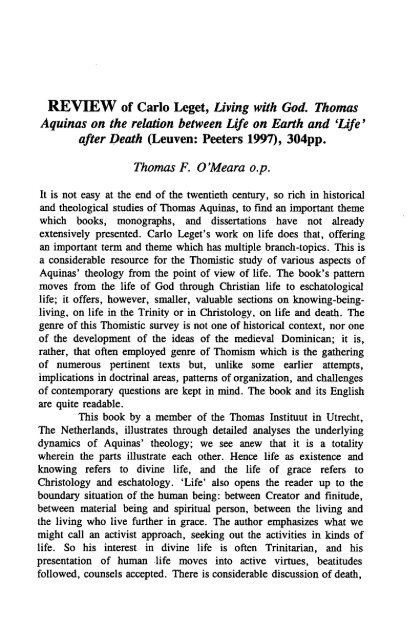Jaarboek Thomas Instituut 1997 - Thomas Instituut te Utrecht
Jaarboek Thomas Instituut 1997 - Thomas Instituut te Utrecht
Jaarboek Thomas Instituut 1997 - Thomas Instituut te Utrecht
You also want an ePaper? Increase the reach of your titles
YUMPU automatically turns print PDFs into web optimized ePapers that Google loves.
REVIEW of Carlo Leget, Living with God. <strong>Thomas</strong><br />
Aquinas on the relation betweenLife on Earth and 'Life'<br />
af<strong>te</strong>r Death (Leuven: Pee<strong>te</strong>rs <strong>1997</strong>), 304pp.<br />
<strong>Thomas</strong> F. O'Meara o.p.<br />
It is not easy at the end of the twentieth century, so rich in historical<br />
and theological studies of <strong>Thomas</strong> Aquinas, to find an important theme<br />
which books, monographs, and dissertations have not already<br />
ex<strong>te</strong>nsively presen<strong>te</strong>d. Carlo Leget's work on life does that, offering<br />
an important <strong>te</strong>rm and theme which has multiple branch-topics. This is<br />
a considerable resource for the Thomistic study of various aspects of<br />
Aquinas' theology from the point of view of life. The book's pat<strong>te</strong>rn<br />
moves from the life of God through Christian life to eschatological<br />
life; it offers, however, smaller, valuable sections on knowing-beingliving.<br />
on life in the Trinity or in Christology. on life and death. The<br />
genre of this Thomistic survey is not one of historical con<strong>te</strong>xt, nor one<br />
of the development of the ideas of the medieval Dominican; it is,<br />
rather, that of<strong>te</strong>n employed genre of Thomism which is the gathering<br />
of numerous pertinent <strong>te</strong>xts but, unlike some earlier at<strong>te</strong>mpts,<br />
implications in doctrinal areas, pat<strong>te</strong>rns of organization, and challenges<br />
of con<strong>te</strong>mporary questions are kept in mind. The book and its English<br />
are qui<strong>te</strong> readable.<br />
This book by a member of the <strong>Thomas</strong> <strong>Instituut</strong> in <strong>Utrecht</strong>,<br />
The Netherlands, illustra<strong>te</strong>s through detailed analyses the underlying<br />
dynamics of Aquinas' theology; we see anew that it is a totality<br />
wherein the parts illustra<strong>te</strong> each other. Hence life as exis<strong>te</strong>nce and<br />
knowing refers to divine life, and the life of grace refers to<br />
Christology and eschatology. 'Life' also opens the reader up to the<br />
boundary situation of the human being: between Creator and finitude,<br />
between ma<strong>te</strong>rial being and spiritual person, between the living and<br />
the living who live further in grace. The author emphasizes what we<br />
might call an activist approach, seeking out the activities in kinds of<br />
life. So his in<strong>te</strong>rest in divine life is of<strong>te</strong>n Trinitarian, and his<br />
presentation of human life moves into active virtues, beatitudes<br />
followed, counsels accep<strong>te</strong>d. There is considerable discussion of death,








